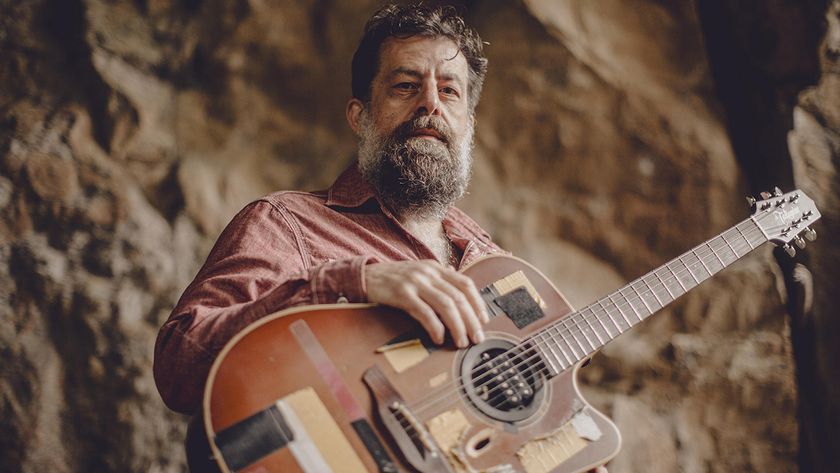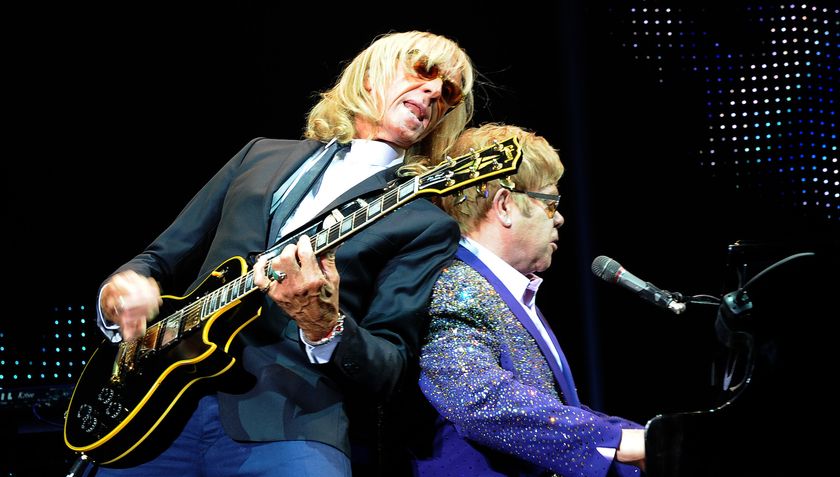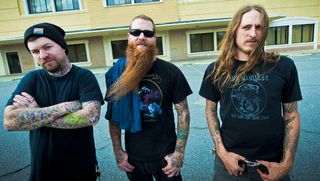
"The music's as thick as the air, it just kind of works," says Black Tusk bassist Johnathan Athon, speaking of the band's signature mix of doom-metal sludge with hardcore ethos.
Dubbed "swamp metal," the Savannah, Georgia-based band released their latest album, Set the Dial, earlier this week, an album that's sure to land near the top of many a year-end list. While there's nothing "progressive" about the album, the guys have noticeably honed their craft.
The songs that make up Set the Dial are concise, never wasting a note or adding that doesn't need to be there. From the opening "Six, six, six!" chant of "Brewing the Storm" to the manic stomp of album closer "Crossroads and Thunder," Black Tusk have made an album that is meant to be listened to in one sitting -- a rare feat in today's ADD culture.
We recently caught up with Black Tusk guitarist Andrew Fidler and bassist Johnathan Athon so they could tell us just what is in the water down in the swamps of Georgia.
For the uninitiaed out there, what is "Swamp metal"?
JOHNATHAN ATHON: [laughs] That's funny. It's just something that came out. You know, everyone tries to define the music they play, under some sort of banner that's easily recognizable, and we just came up with that one day. It just just kind of refers to the climate we're from, dealing with the heat and humidity and all that kind of stuff.
It seems like Georgia's got a pretty vibrant metal scene these days; would you agree?
Get The Pick Newsletter
All the latest guitar news, interviews, lessons, reviews, deals and more, direct to your inbox!
ANDREW FIDLER: I think the Atlanta scene is definitely a lot bigger than the Savannah scene. Maybe in the late '90s or early 2000s Savannah had a pretty good scene going on -- a lot of underground bands and a lot of bands touring and stopping through here -- but in the past five or six years, not too much has gone on here at all. Most of those kids are gone now. We don't get that many shows anymore. But the people who are still here are die-hards. They'll come out and support shows.
You guys pull in elements from a pretty wide range of genres -- doom metal, sludge, hardcore, punk -- yet in interviews, you're often reluctant to name influences. Is that to avoid being compared to another act for the rest of your career just for naming them in an interview?
ANDREW: No, it's just really not how we write. We don't really sit down and put on the new Mastodon record or something and say, "How can we make something like this?" There's just a wide range of music, we just sort of let it come together in our heads without actually thinking about recreating a certain band's sound to do something for us. We take it all in and what comes out is our own sound, ya know?
I grew up in North Carolina, and I can definitely hear a Southern tinge to the music. Would you recognize that as a part of your sound?
JOHNATHAN: Oh, absolutely. James and I were born and raised here in Savannah and Andrew was born in Tennessee and raised here. It's just always been around, it's just part of our lives. It's in our blood. It's not really any particular band, that's just kind of how it happens.
When you sit down to do a record, are there every any pre-conceived notions about the music, maybe constraints you place upon yourselves, or is the process more free-flowing?
JOHNATHAN: It's all pretty free-flowing. Once we get a couple of songs going, we'll kind of get an idea of where the album's gonna go and can sort of taylor it in that direction. But there's always room for, "Oh, you just played that, and that needs to go in there." There's never anything set in stone as far as writing the music. It all just kind of happens.ANDREW: It kind of writes itself. How is your songwriting process as a band? Do you jam a lot or do people tend to bring in more fully-formed ideas?JOHNATHAN: It's a little bit of everything. We just get in there and start playing, and while somebody's tuning, someone else will just start playing something. Or someone will bring in a riff or an idea or a drumbeat. And we'll just figure out where it should go and then build around it. But we always end up taking those ideas and putting them on the backburner for a while then coming back to them so we can re-evaluate them. Talk a bit about the gear used on Set the Dial.ANDREW: It was cool because Jack [Endino, producer] is friends with Mike Soldano, so he went to Mike's workshop and Mike hooked him up with a bunch of amps for the record. I used a couple of Soldano-modded JCM-800s that were pretty awesome.JOHNATHAN: I've got a couple of custom-built basses by this guy I met when we played a C.O.C. [Corrosion of Conformity] show. He started building guitars and basses -- they're called Schweet. He built me a bass and I loved it. Then he built me another one to go on tour in Europe and I loved that one even more, so I took that in the studio along with my custom G&L.I usually run nothing but Mesa Boogies, but I ended up using an old Ampeg SVT too. Basically the Ampeg version of the Mesa Boogie 400 Plus.One of the early tracks that really stood out to me was "Ender of All," which really puts the riffs and the hooks up front. I think it's a great example of how concise your songwriting has gotten with this record.JOHNATHAN: We definitely tried to tighten everything up. We've honed our skills a bit more. We're always going to try and one-up ourselves.Do you ever feel any pressure to one-up yourselves?JOHNATHAN: Sometimes, but overall, no. A simple riff, if it's good, you can't beat that. There's never a reason to try and have to do something ridiculous with it. If it works, it works."Resistor" has the only acoustic part on the album. How did that come about?ANDREW: The studio owner has a Martin, a D-12 I think it was. That song's the only instrumental song on the record, so we wanted it to kind of start pretty and then fade it in then have it kick in with the acoustic fading out. That was kind of the idea of what we were going for with that.One of the really unique things about the band is that the three of you share vocal duties. How do you go about deciding who sings what? Is it about whose voice suits that part of the song best, or do you pretty much sing what you write?ANDREW: We always think about the part of the song and the lyrics, because we have three different voices that we can use. We think about whose voice would be accompany the music for that part. Everybody's got a different style of vocals too, so we look at what style best fits this song, or this part and work it from there.JOHNATHAN: Being a three-piece band, there are certain things that you just can't do that a five-piece band can, so you have to make up for certain things, and why not use that to our advantage? Three people who can all do vocals while you play -- go ahead and use that to your fullest ability, because there's only three of you there to begin with, you know?The new album from Black Tusk, Set the Dial, is out now on Relapse Records.
Josh Hart is a former web producer and staff writer for Guitar World and Guitar Aficionado magazines (2010–2012). He has since pursued writing fiction under various pseudonyms while exploring the technical underpinnings of journalism, now serving as a senior software engineer for The Seattle Times.
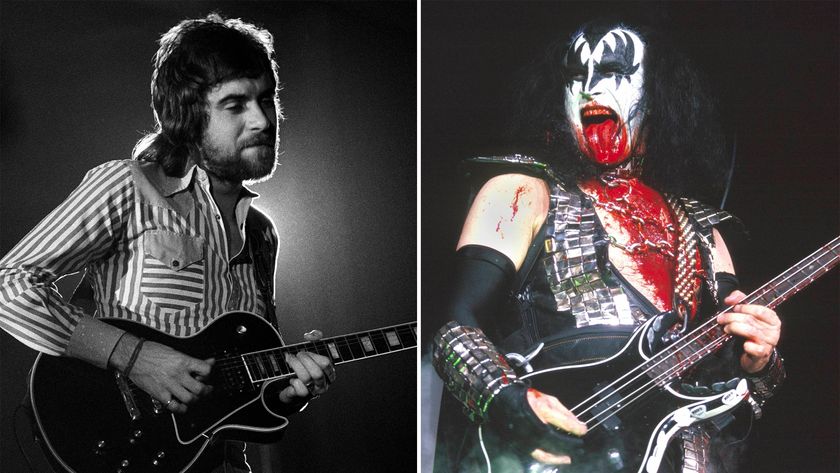
“I had to use the same microphone that Gene Simmons used with all the blood coming out of his mouth. Can you imagine that!”: Mick Rogers recalls Kiss supporting Manfred Mann's Earth Band in their early days
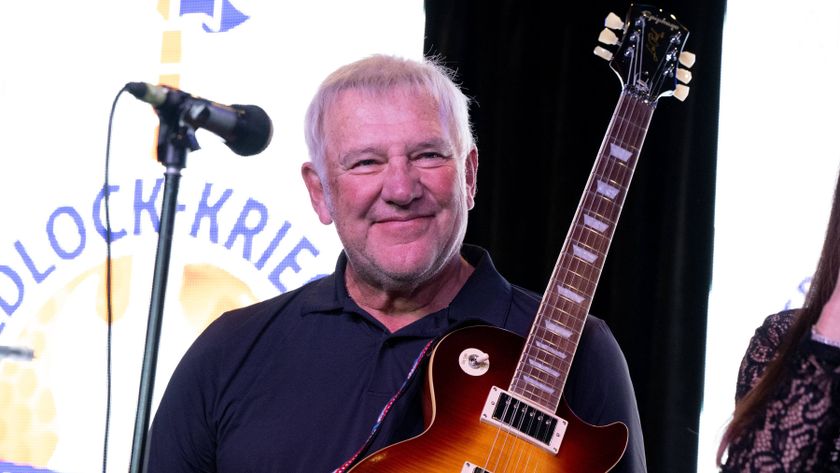
“It’s a whole new generation in sound. There’s nothing lacking”: Alex Lifeson reveals the gear that has finally converted him to digital modeling









